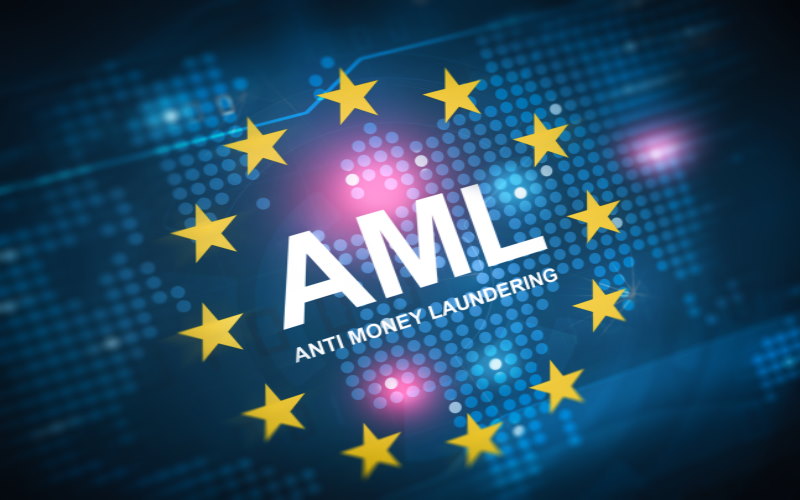The European Union’s Fifth Anti Money Laundering Directive (5 AMLD) must be implemented in national law by 10 January 2020. The Anti Money Laundering Directive has been continually updated and tightened ever since its introduction in 1990 with a view to making it harder for money launderers and terrorists to move their cash in and out of, and around, the EU. We highlight five things to watch out for in this latest iteration.
- New sectors affected
Until now AML rules have affected banks, accountants, building societies and gambling operators, plus accountants and lawyers. In addition to requiring these to comply with new rules and to review their existing procedures, 5 AMLD will affect new sectors. Most directly affected will be estate agents and intermediaries for properties with monthly rents in excess of € 10,000. They now fall under AMLD jurisdiction, as do the beneficial owners of such properties. Information on real estate ownership must be made available to the relevant public authorities. Clearly in view here are investments in valuable properties, for example in central London, which have served as a useful medium for drug traffickers and illegal arms dealers etc. to launder the proceeds of their activities. Anyone involved in high-end real estate will be under pressure to review when and how often they verify the identity of their customers to establish beneficial ownership.
The art world was not explicitly within the scope of 4 AMLD or previous iterations of the directive. Now, despite fierce resistance from the art world, 5 AMLD will require auction houses and art dealers also to undertake anti money laundering checks on customers. Establishing systems to carry out such checks will carry significant resourcing implications, and any failure to undertake checks with sufficient rigor can attract criminal penalty, for both institutions and their directors.
5 AMLD updates the current directive to include the following within the definition of “obliged entities”: persons trading or acting as intermediaries in the trade of works of art, including when this is carried out by art galleries and auction houses, where the value of the transaction or a series of linked transactions amounts to EUR 10,000 or more. This applies whatever the method of payment: cash, cheque, bank transfer, bitcoin etc.
All of this means that the estate agents, rental intermediaries, art galleries and auction houses affected must act now to put AML processes and procedures in place, and invest in the necessary technologies to meet their new obligations. These include registering with the relevant authority, conducting a money laundering risk assessment and carrying out customer due diligence especially in relation to transactions or business relationships that involve persons established in a high risk third country (see below), politically exposed persons etc.
In other words, quite a few companies will face a new resource burden. This will also affect their financial services providers, lawyers and accountants, so they should seek advice on how to ensure that compliance is cost-effective within their financial means.
2. Catching up with new technologies
The speed with which 5 AMLD has followed hot on the heels of 4 AMLD reflects the speed of technological change and the new ways in which business is conducted. Under 5 AMLD custodian wallet providers and virtual currency exchange platforms will fall within the scope of AML laws, as they too have been added as new “obliged entities”.
5 AMLD also allows and indeed promotes the use of electronic identification for customer due diligence. This directive stipulates a need, whenever possible, to use electronic client verification solutions when undertaking due diligence obligations and KYC procedures. Institutions that have not already done so should invest in the technology for quicker onboarding of new clients through instant results. Not only does it help ensure compliance, it also improves the customer experience.
Also, financial institutions across the globe are transitioning to artificial intelligence and machine learning technologies to help improve pattern detection, increase automation and alert accuracy.
3. Tougher enforcement
There will be new national bank account registers in each EU Member State to enable easy access by law enforcement authorities to bank account information for all bank accounts held in that Member State. The registries will all be interconnected between Member States. In addition, enforcement authorities will be able to request information from an obliged entity even where no Suspicious Activity Report has been filed.
4. Tighter controls on high risk third countries
Credit institutions dealing with business relationships and transactions involving high risk third countries or having establishments in these countries may be particularly affected. The current list includes Afghanistan, Ethiopia, Iran, Iraq, North Korea, Pakistan, Sri Lanka, Syria, Trinidad and Tobago, Tunisia, and Yemen. It has been proposed to add American Samoa, Bahamas, Botswana, Ghana, Guam, Libya, Nigeria, Panama, Puerto Rico, Samoa, Saudi Arabia, and the US Virgin Islands. 5 AMLD prescribes enhanced due diligence measures for business relationships or transactions involving high risk third countries, and also allows Member States to restrict obliged entities from opening branches/subsidiaries in high-risk third countries, and to restrict the opening of branches in a Member State of an obliged entity based in a high-risk third country.
5. Public scrutiny of beneficial ownership
There will be wider access to each Member State’s central register of beneficial ownership of corporates. Any member of the general public can access basic information without the need to demonstrate a “legitimate interest” (this is already the case in the UK). There is also a new “discrepancy reporting requirement” that will require obliged entities to report any discrepancies they find between the information that they hold, and the information on the register.
5 AMLD also extends beneficial ownership reporting requirements to any legal arrangement that is similar to a trust, as well as tax-neutral trusts. It also widens access to the central register of beneficial ownership to any person who can show a “legitimate interest”. It is left to the discretion of individual Member State to define legitimate interest, although 5 AMLD states that the definition should not restrict the concept to cases of pending administrative or legal proceedings, and should take into account the preventive work undertaken by non-governmental organizations and investigative journalists in the field of anti-money laundering, counter-terrorist financing and associated predicate offences.
6. Brexit has no impact
The United Kingdom has committed to adopting 5 AMLD along with the rest of Europe, either as part of the proposed transitional arrangement or some other deal which requires regulatory convergence in return for preferential access to the Single Market. Even in the event of a “no deal” Brexit after the transitional period, the UK – as a leading member of the Financial Action Task Force on Money Laundering (which sets the standards which underpin EU anti-money laundering law) – is unlikely to let UK AML standards fall behind those applicable elsewhere in Europe.
7. Other
Other new regulations include the ban on anonymous safe-deposit boxes and the subjecting of more prepaid instruments to due diligence (e.g. gift cards and travel cards). The threshold requirement on these has been reduced from €250 to €150. Finally, if that is not enough to take in, Member States will be required to transpose the next iteration – 6 AMLD – into national law by 3 December 2020. After which, relevant regulations must be implemented by firms within Member States by 3 June 2021.
One of the positives about 6 AMLD is that it is more specific on the offences that all EU Member States must criminalize – 22 so-called predicate offences for money laundering in total. In addition to the obvious ones these include environmental offences, cybercrime, and direct and indirect tax offences.
Wishing everyone a Happy and Healthy Holiday Season!
Please join the conversation at AML Knowledge Centre https://www.linkedin.com/groups/8196279/
written by Paul Allen Hamilton https://www.linkedin.com/in/paulhamilton2/
and Volha Miniuk https://www.linkedin.com/in/volhaolgaminiuk/



